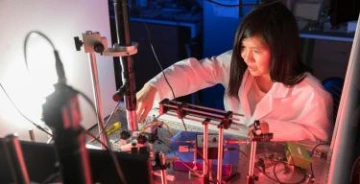Date Published: June 22, 2021
FLOWER: How a Tiny Loop of Light Could Help Fight COVID-19
At the Wyant College of Optical Sciences’s Little Sensor Lab, researchers are building sensors that have three key advantages: They can detect low concentrations of substances, provide results in 30 seconds or less, and they don’t need to label or amplify the substance they’re trying to detect. But perhaps the best part? They may be helpful in detecting and treating COVID-19, cancer and scores of other harmful or deadly contaminants.
This technology could be useful in medical diagnostics, environmental health monitoring and detecting chemical threats, said Judith Su, Ph.D., assistant professor of optical sciences and biomedical engineering. In fact, it shows such promise that it was awarded a $1.82 million grant from the National Institutes of Health.

Judith Su, an assistant professor of biomedical engineering and optical sciences, runs the UArizona Little Sensor Lab, where researchers are finding ways to use a one-of-a-kind technology to address some of the medical community's most pressing problems. (Photo: Chris Richards / University of Arizona)
